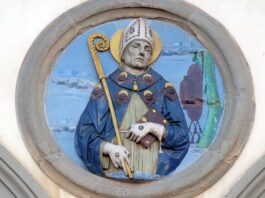
Saint Bonaventure, affectionately known as “the Seraphic Doctor,” was born in Bagnorea, near Viterbo, in 1217. Legend tells us that his name, Bonaventure, emerged from an exclamation by St. Francis of Assisi. When St. Francis was asked to pray for the recovery of the young and ailing John, he did so, foreseeing the boy’s remarkable future and exclaiming, “O Buona ventura!” — “O good fortune!”
At twenty-two, Bonaventure entered the Franciscan Order. After taking his vows, he was sent to Paris to finish his education under the renowned Franciscan scholar, Alexander of Hales, an Englishman. Following Hales’ death, Bonaventure continued his studies under Hales’ successor, John of Rochelle. It was during his time in Paris that he formed a close bond with the esteemed St. Thomas Aquinas. Both Bonaventure and Aquinas were awarded Doctorate degrees; however, in a show of deference and humility, Bonaventure allowed Aquinas to receive the honor first, despite Aquinas’s reluctance. The two shared a mutual friend in the virtuous King, St. Louis.
By the age of thirty-five, Bonaventure had been chosen as the General of his Order. He swiftly restored harmony where discord had once reigned due to internal conflicts. His contributions to his Order were numerous, including the composition of ‘The Life of St. Francis.’ He also took part in the relocation of the relics of St. Anthony of Padua. Pope Clement IV nominated him for the position of Archbishop of York, a title he humbly declined. Nonetheless, Gregory X insisted on bestowing upon him the greater roles of Cardinal and Bishop of Albano, one of the six subsidiary Sees of Rome. Before his death, Bonaventure relinquished his role as the General of the Franciscan Order. He passed away while attending the Second Council of Lyons on July 15, 1274.
Editorial credit: Zvonimir Atletic / Shutterstock.com
The post Saint Bonaventure appeared first on uCatholic.
Daily Reading
Memorial of Saints Basil the Great and Gregory Nazianzen, Bishops and Doctors of the Church
Readings for the Memorial of Saints Basil the Great and Gregory Nazianzen, Bishops and Doctors of the Church Reading 1 1 John 2:22-28 Beloved: Who is the liar? Whoever denies…
Daily Meditation
A Voice in Today’s WildernessUna voz en la jungla de hoy día
Click here for daily readings Today’s Gospel passage is especially relevant as we begin a new year with resolutions and hope. In this reading we hear John’s declaration echoing the…




